| | | | |  | Brunel University London |
Brunel Institute of Power Systems (BIPS) is an internationally recognised power systems research group based in BruneL University, London, UK. BIPS currently consists of five academic research and teaching staff, four research fellows, three research associates and over thirty PhD students. In addition BIPS is currently coordinating a major collaborative pan-European FP7 funded R&D project entitled 'High Performance Computing Technologies for Smart Distribution Network Operation (HiPerDNO)'. In addition we are also collaborating with the University of Oxford on a major UK EPSRC funded R&D ICT and Energy Smart Grids research project entitled 'Advanced Dynamic Energy Pricing and Tariffs (ADEPT)'. BIPS is also collaborating on another major national RCUK funded project entitled 'Scenarios for the development of smart grids in the UK'.
BIPS is also collaborating with National Grid in the UK on the following three smaller Smart Grid R&D projects concerning CIM adoption, PMU deployment and on-line stability analysis.
All of the above projects are associated with emerging ICT standards that are required for Smart Grid deployment, such as CIM and IEC61850.
| |  | Comillas University | | | 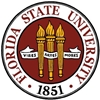 | Florida State Universtiy | Florida State University is conducting research on:
- Network Security for Transmission and Substation Automation
- Power grid Wide Area Monitoring Systems (WAMS), and
- Power grid Wide Area Actionable Systems (WAAS).
| | 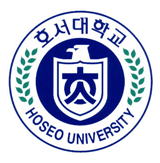 | Hoseo University | The Institute of New Technology of Electrical Energy was established in 1999, whose members are mainly faculty members of The Department of Electrical Engineering and The Department of Digital System and Control Engineering. Its research area in 2010s covers smart grid or microgrid; especially energy management system with renewable resources and electrical energy storage in collaboration with industrial companies, research institutes and utilities, where the special topics are database migration of national-wide energy management system, real-time economic operation strategy, power system analysis applications for energy management system and power system engineering for smart gird or microgrid design. | |  | Karlsruhe Institute of Technology | On October 01, 2009, the Karlsruhe Institute of Technology (KIT) was founded by a merger of Forschungszentrum Karlsruhe and Universität Karlsruhe.
KIT bundles the missions of both precursory institutions: A university of the state of Baden-Wuerttemberg with teaching and research tasks and a large-scale research institution of the Helmholtz Association
conducting program-oriented provident research on behalf of the Federal Republic of Germany. Within these missions, KIT is operating along the three strategic fields of action of research, teaching, and innovation.
The KIT Energy Center with its 1100 employees is one of the largest energy research centers in Europe. It bundels the energy research activities of the KIT, the merger of the former Forschungszentrum Karlsruhe and Universität Karlsruhe and reknown cooperation partners. By this, it crosses the lines between disciplines and combines fundamental and applied research in all relevant energies for industry, household, service and mobility. | | 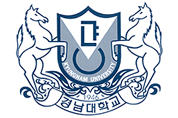 | Kyungnam University | Powersystem Lab of Kyungnam University is studying Power and IT. We are interested in Distribution Automation System, Substation Automation System, and Service Oriented Architecture. In the past, we have developed a fault test algorithm classified Logical Node in substation automation system based on IEC 61850 research. And we have researched information integration technology of powersystem based on webservice. The present, we do develop Smart Distribution Management System in regard to Smart Grid. In this study, we take care of three sections that are fault section detection technology develop in interactive distribution system, outage restoration guide in interactive distribution system, and outage restoration implementation technology by P2P communication. We are interested in IEC 61970, 61968. So, we are studying IEC 61970, 61968 standard. We want to make distribution management system based on CIM and would like to integrate systems. Also, we are concerned with interoperability between IEC 61970 and IEC 61968. We should like to know harmonizing CIM and 61850. | | 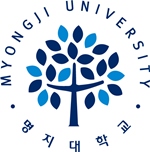 | Myongji University | Next-Generation Power Technology Center of Myongji University does research on Power System and communication technology.
Next-Generation Power Technology Center (NPTC), an Engineering Research Center (ERC) sponsored by the Korean Ministry of Science and Technology and The Korea Science and Engineering Foundation (KOSEF), was established in 2001 with the aim of developing the next-generation protection and automation technology of electrical power systems. This innovative technology, which blends ICT (Information Communication Technology) and AI (Artificial Intelligence) with conventional power technology, is expected to play a key role in every aspect of power systems in a near future. The recent large-scale blackouts around the world have proved the significance of developing new protection and control technology for the new power industry environment. Consequently, many world-leading companies and research institutes are concentrating their efforts on developing the next-generation power technology. NPTC is expected to be a world-leading research institute dedicated to the protection and SAS (station automation system) technology in a near future. The goal of NPTC is technological innovation, which would contribute to more reliable and secure power system in not only Republic of Korea but also the other parts of the world and more convenient human life eventually. | |  | RWTH Aachen University |
In the area of simulation RWTH runs a very advanced real-time simulation lab where we have installed 8 racks of RTDS last generation (the most powerful installation in Europe at the moment). We also have an advanced PC Cluster for multiphysics simulation, and we arebdeveloping and building (in collaboration with a local spin-off company) an advanced multi-DSP modular real-time platform for simulation of distributed systems. In our lab we have also developed a method for combined real time simulation between power networks and communication networks with the possibility to simulate network delays and packet loss in real-time. Our interest in real-time simulation brought us also to develop original solution for Hardware in the Loop. We have designed and built a controllable power interface, called FlePS (Flexi-ble Power Systems) to close the loop of the real time simulation on real electrical hardware up to 25 kW.
Together with another institute of our Center (Institute for Energy Efficient Building and Indoor Climate, Prof. Müller) we have developed a multi-physics hardware in the loop setup that can be used to study Smart Home Energy Systems. This platform is now applied in several industrial projects as reference system to test new equipments. In the next few months, our Real-Time lab will be connected via fiber optic links to our Medium Voltage Testing Facility where we will be able to test in Hardware in the Loop equipments up to 5 MW.
Next year our real time capability will be also included in a new Center under construction at RWTH called Center for Wind Drives where we will be able to test the drive train of real wind equipments up to 4 MW. A part from the simulation work, we are also involved in many other projects concerning Smart Grids in various areas such as Phasor Measurement Units, Distributed State Estimation, Distributed Control of Distributed Energy Resources.
| | 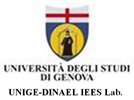 | UNIGE | IEES – Intelligent Electric Energy Systems – UNIGE-DINAEL (Department of Naval Architecture and Electrical Engineering) University of Genova
The IEES Lab operates in the following scientific and industrial sectors: Management and optimization of the electric system and of the energy and ancillary services markets. Power system monitoring and preventive-corrective Control. Analysis, modeling and simulation of power system components and controls. Decision support systems and artificial intelligence (AI) applications to the planning and control of large power systems and industrial systems. Advanced technologies and methodologies for power systems protection. Electric distribution systems with distributed generation (DG). Innovative technologies for electric power microgeneration. Real time load monitoring and management for consumption rationalization and energy saving. Systemistic and design aspects of lighting engineering and domotics.
Current Projects:
SmartGen leader SOFTECO, Genova, ENEL, University of Genova and Bologna, entitled: “Study, development and validation of innovative methods and tools for active distribution networks management with renewable energy sources”, supported by Ministero per lo sviluppo economico - (2011-2013) www.smartgen.it .
Project FP7 AFTER “A Framework for electrical power sysTems vulnerability identification, dEfense and Restoration”, leader RSE Milano, 13 partners (RSE - Ricerca sul Sistema Energetico, ENEA, SINTEF EN, SINTEF ICT, University College Dublin, City University - London , ALSTOM Power, SIEMENS, Commission of the European Communities Joint Research Centre, ELIA, Terna Rete Elettrica Nazionale SpA, ČEPS, a.s.) (2011-2013). | | 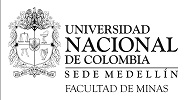 | Universidad Nacional de Colombia | The T&T Group - Research on Teleinformatics and Teleautomatic at Universidad Nacional in Colombia is involved in several Smart Grid research projects. The T&T Group has the support of Codensa, a colombian utility that distributes electricity throughout the city of Bogotá.
Currently fields of research in the T&T Group are:
- Substation Automation based on IEC 61850
- Cybersecurity for power utility
- Projects concerning CIM adoption
All of the above projects are associated with emerging ICT standards that are required for Smart Grid deployment. | | | http://www.frm.utn.edu.ar | The University is currently working on a smart grid project, which isa collaboration between the electric power company Edeste S.A, and UniversidadTecnologica Nacional, in Argentina. The project mentioned, allows students to improve their knowledge in the workplaceand doing so in an innovative project, both at provincial level and at countn; level; inaddition, the company Edeste S.A, receives the benefits given by an intelligent network. Overall project covers the following aspects:
- Implementation ofan AMI system.
- Development ofinterfaces between the AMI system and legacy systems.- Development of new systems to exploit the capabilities of the smart grid.- Maintenance and improvement ofsystems. | |  | | Strathclyde is generally very active in smart grid research. We have one of the largest power systems researchgroups in Europe, with over 200 staff and PhD students. Our Power Networks Demonstration Centre (PNDC) isan industrially supported smart grid test facility, which allows practical implementation and testing of researchat 11 kV and 400 V. We co-host a Centre for Doctoral Training in “Future Power Networks and Smart Grids” which will support 55 new PhD students over the next 5 years. | |  | University of Tulsa | The Department of Electrical Engineering offers a wide range of power engineering courses at both the undergraduate and graduate level. Research is conducted as a joint effort between faculty in the Dept. of Electrical Engineering and Tandy School of Computer Science in critical infrastructure protection (security) for the smart grid and electric utility sector. The Institute for Information Security (iSec) is an inter-diciplinary group that investigates security and critical infrastructure protection. iSec is recognized by the US Security Agency (NSA) as a Center of Excellence in Research and Education.
iSec houses a working substation (using reduced voltage levels - 3KVA with 3-phase 208V input), with a control room (human-machine interface). The substation provides a real world platform for a Critical Infracture Protection course (Computer Science - graduate level) and research into substation automation and security of substation networks. The security of home area networks for automating electricity usage and smart meters are other areas of research.
The link to the Dept. of Electrical Engineering homepage is: http://www.utulsa.edu/academics/colleges/College-of-Engineering-and-Natural-Sciences/Departments-and-Schools/Department-of-Electrical-Engineering.aspx
The link to the Tandy School of Computer Science homepage is: http://www.utulsa.edu/academics/colleges/college-of-engineering-and-natural-sciences/departments-and-schools/tandy-school-of-computer-science.aspx
| | | University ol Jyvaskyla | The Agora Center is an internationally recognized and networked research center for interdisciplinary, innovative research on human technology and the knowledge society at the University of Jyvaskyla. It creatively combines research of high international standards from a variety of scientific disciplines with the know-how derived from its diverse partner network.
The Industrial Ontologies Group (IOG) Within the Agora Center is a research group whose main areas of interest are Semantic Web, multi-agent systems and cloud computing (http://www.cs.jyu.fi/ai/OntoGroup/). The ultimate goal of the group is the creation of Global Understanding Environment (GUN) where different heterogeneous resources (physical devices, software, humans, etc.) are capable of forming self-managed ecosystems by "understanding" and utilizing each other's services. IOG also has a long history of cooperation with industrial partners, Among UCAIug members, IOG has cooperated with Fingrid and ABB. IOG's main interest within UCAIug is CIM model and therefore CIM Users Group. We have experience of integration of heterogeneous data sources using Semantic Web technologies. We would like to find methods for easy migration from legacy systems to CIM-based systems, and their further integration. | |  | University of Salerno |
The research project we aim to deepen is to investigate on the development of new approaches, based on recent ICT proposals, for the enhancement of Smart Grids management. This research goal is from a long time active in University of Salerno, here we detail some specific items currently in progress among the research team of LASA (Laboratory of Agent-based Systems), Dept. of Computer Science at University of Salerno.
The basic consideration comes from our observation that classical ICT platforms are not capable to support with full capacity the new challenges offered by recent enhancement of Smart Grids, especially if we consider the remarkable improvements in terms of Energy Efficiency, Provisioning, Forecasting, Demand Response facilities.
Our research initiative consider as a strategic point the synergistic combination of the following technological stream
1) Semantic Web
2) Computational Intelligence
3) Multi-Agent Systems
We have started to combine these approaches to face with some complex problems around Smart Grids. As main research objective, we are investigating on the role of Web Semantic technologies (in particular the role of Ontologies) as more powerful approach to describe the contextual domain of electric grids, not only considering the electrical elements, but extending this approach also to describe “actors” that interact with the smart grids, for example maintenance teams. The ontological representation enables to improve some complex task of decision support systems, we are focusing in fieldforce management, by linking ontology-based information/services with advanced (multi)optimization criteria.
We aim to relate this research project with CIM standard, in order to try to develop some open-source deliverable that we hope can be useful for the CIM community.
| |  | Institute of Computer Aided Automation |
The Vienna University of Technology is involved in several national and international Smart Grid research projects. The project Smart Web Grid sets a focus on the exchanged information and standardized communication interfaces based on Web services for Smart Grids.
| | 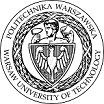 | | The Institute of Electrical Power Engineering of Warsaw University of Technology has extensive experience in the research and implementation work carried out on behalf of the industrial sector. This work implements large and experienced staff. One of the areas of the works are studies on microgrids. The Institute is very active in publishing their scientific achievements. The Institute of Electrical Power Engineering conducts research work and implementation of the following, selected topics:
- modeling and digital simulation of networks and operating conditions of power systems,
- databases for power systems,
- computer systems to support the use and operation of power grids,
- optimization in power systems,
- microgrids and distributed generation,
- forecasting the demand for power and electricity,
- digital protections equipment,
- WAMS based control,
- renewable energy sources,
- power quality,
- economics in electrical power engineering.
| | 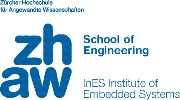 | ZHAW | The Institute of Embedded Systems at the Zurich University of Applied Sciences is a leading R&D institution in the field of industrial communication. Apart from applied research activities in the development of new communication technologies we offer both turnkey and adaptable IP in the form of FPGA and/or Software for applications in functional safety as well as communication systems in decentralised Energy-Solutions automation. Currently fields of activitiy are:
-
Ethernet based high-performance communication solutions (PROFINET, EtherNet/IP etc)
-
High precision time synchronisation via packet orientated networks (IEEE 1588)
-
High-Availability communication solutions (MRP, PRP, HSR etc)
-
Energy Automation (IEC 61850)
|
|
|
|
|